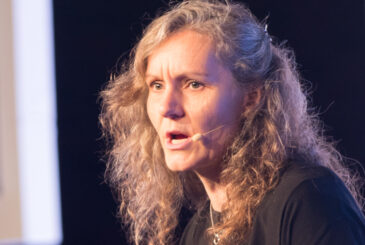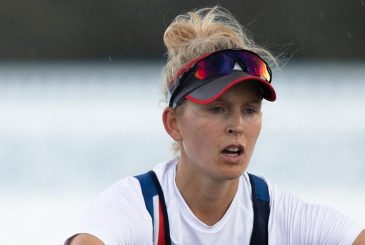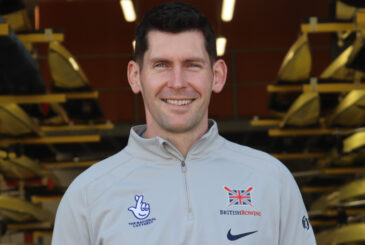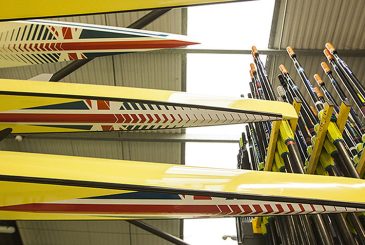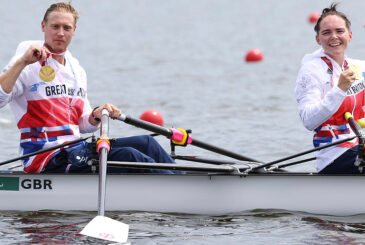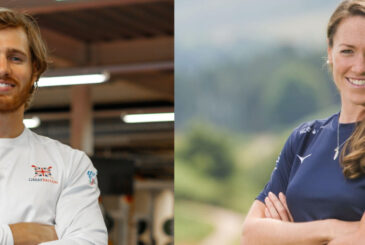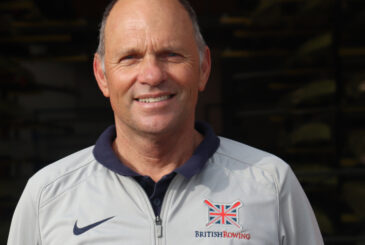In our series celebrating some of the most dramatic Olympic finals since 2000, Martin Cross selects his top races, reliving the experience with athletes involved. In the fifth Olympic final of the series, he spotlights the men’s eights at London 2012, reflecting on the race with GB cox Phelan Hill and Martin Sauer, who coxed the famous Deutschland-Achter
The men’s eight was one of the most eagerly anticipated events of the 2012 Olympics. It did not disappoint. The rivalry between Britain and Germany, where the home crew surged ahead of the fast-starting Germans, created an unforgettable contest in the third 500m. For a time, at least, it looked as though the massive home crowd would get their wish and see the British eight beat the German favourites.
More than that, the contest between those two boats created openings for other crews, most notably Canada whose final surge took them to a remarkable silver, behind Germany. The other three eights from the USA, the Netherlands and Australia were all within 0.7 seconds of the bronze medal, which the British, who had thrown everything into that third quarter, clung on to by the skin of their teeth.
It was a race to remember. Recently Martin Sauer and Phelan Hill, the coxes of the German and British crews joined me to talk about that race and the events surrounding it. Sauer is coxing the German eight at the Tokyo Olympics, while Hill retired after coxing the British eight to a gold medal in the Rio Games.
Martin Sauer: We started the season with a clear goal to win the gold in London – we were the world champions in Bled by two seconds. We were a really strong group, the best for 10 years in Germany. We knew we were the favourites. I don’t think it’s a big problem being a favourite – I like to be a favourite. Most times the favourites win – not the underdog.
We had a good streak through the Olympic cycle, but in Germany we [were] still doubted from the rowing perspective. The German eight had finished last in the Beijing Olympics, so the thinking was that the German eight don’t always get it right. That was more pressure than being the favourites.
The Belgrade World Cup was really a tough race [with the British] to the 1,000m mark and then we got a length. Half the crew was ill after Belgrade and we were really struggling until Lucerne and that’s the reason why we didn’t go to the third World Cup in Munich. So, for us, there was a long time from Lucerne to the London Olympics.
“It seems a bit insane going into the start line in the heat of Olympics and it’s the first time you’ve raced that combination”
Phelan Hill: Going into 2012 there was quite a lot of optimism. There were changes in the other boats, Pete [Reed] and Andy [Hodge] went from the pair to the four. Rick [Egington] and Matt [Langridge] came out of the four into the eight and we also had Stan [Louloudis] who at that stage was young, but we knew how talented he was.
I have to say that this crew was one of the most talented group of athletes I’d rowed with, but we didn’t have enough time to gel. Stan getting injured before Belgrade didn’t help because, through regattas like Belgrade and Lucerne, we never had consistency over the crew. Going into London it still felt like we were chasing. When you go out to race you just want say let’s just execute what we did in training, but training was so volatile. So, by the pre-Olympic camp we had Stan back in the crew; we went into London knowing our best stuff was really good, but not knowing what we’d really get.
Martin: After the draw for the opening heat of the Olympics, our coach Ralf Holtmeyer was really fed up that the first four boats from Lucerne [including the British] were in the same heat. But we knew we were here to win the gold, so the other crews also probably felt fed up about racing in the same heat.
I remember it was perfect weather. It was the first regatta in my life I came to where the stands were full before the racing started. It was a great atmosphere at the first day of racing – really, really cool. It was flat water and, I think, a slight wind. It was good weather, and it was a very good race from the first stroke to the last. We had no problems to win this heat. After Beijing [Germany came eighth] we now knew that we were a better crew.
“It was the first time in this Olympic cycle that we fell in the water”
Phelan: It seems a bit insane going into the start-line in the heat of Olympics and it’s the first time you’ve raced that combination. If we were going to win, we had to beat the Germans, so the more we could race them the better. In the end we finished second behind them, but I was pretty relaxed about the rep off the back of the first race.
Something we’d discussed for a few years was that the first 500m wasn’t fast enough. In between our heat and rep we just worked on the first 500m.
We talked about not really getting good traction; looking for that 1:17, 1:18. I think in the rep we were very much focused on ourselves and in the heat we definitely focused on going toe-to-toe with the Germans. I remember us executing that very well which gave us quite a lot of confidence going into the final.
Martin: Finals day was long. We got really, really nervous. We had to send our coach on vacation two days before the final. He was the most nervous man you can get around in this situation.
We always said, we have to win on a bad day and this ‘bad day’ came strong on that day. I remember when we warmed up, we made a test start – five strokes – and it was the first time in this Olympic cycle that we fell in the water. It was Lukas Mueller – he was so near a crab. I saw the eyes of Kristof Wilke. He looked at me with big eyes and the eyes asked: ‘What’s up here?’. I looked at him and thought they are all nervous. We did another start. It was really crabby, but it was enough.
I was really nervous on the start, and, so, from stroke one to 1,750m it was a really hard race: no rhythm, really a ‘power fight’ and we had to put everything that we’d learnt through four years into the race. When you ask somebody from the crew over these years, they always say the best race was the heat in London and the worst race was the final.
Phelan: Race day for us was very different. James Foad was really badly injured; I still don’t know the full of it, but he woke up with bad back spasms and it was touch and go whether he would race. He was worked on by the physios and was passed fit. Any fears or anxiety we had were put to one side because of the issue with James.
“We’ve already got a silver [from Beijing]; let’s put some seeds of doubt in”
Going into the final, we had a discussion about needing to replicate what we’d done in the rep. We needed to go out from the front and if our bows were in front, then we needed to inch them further in front. If our bows were behind, then we needed to do everything to get our bows back. At the end of the day, we said let’s not settle for silver – let’s not go out and play it safe.
We were quite aware that the Germans always led through the 500m and the 1,000m. We wanted to have that mentality to try and sow seeds of doubt to question them and play on that a little bit. There was definitely a strong mentality that we race for gold. Matt and Rick and Alex [Partridge] said: ‘We’ve already got a silver [from Beijing] let’s get after it and put some seeds of doubt in’.
“If you want to be Olympic champions, you have to do all you can in the next 250m”
Martin: We’re always a crew that likes to go out fast, but we usually have no problem when someone came with us. If they did then we had to decide the race at another point, but in the final we were one meter ahead – not by much and I looked over to the GB crew. Every time we got a second meter, they bounced back. They were always fighting back and I think their plan was not to let us get away – to make it tight and maybe we would have problems when this was the tactics. It was the right one because we had massive problems to get our rhythm up to the 1,250m line. When the GB crew came in front I think that was the turning point for us – the only point when we could lose this race in the Olympic cycle.
Phelan: Through that third 500m when we hit the front, there was that emotive business. I just made calls to trigger an emotive response from the guys. I remember when we were going through 1,250, we were inching and I think that was probably the critical moment if I look back on it. We were going for it at that point. I think if we’d have had another five to 10 strokes of just that inching we might have got the result. I remember the German eight responded, stopped us inching ahead and then started clawing back the lead. All of a sudden you have that pendulum momentum swing. What’s more, we were chasing and then we realised that we’ve put a lot in, but they’re in front now and it became a lot harder.
“I made a crazy decision; the crew made a crazy move and I’m proud of them until this day”
Martin: Being behind was never part of our plan. We like to lead at the front until the finish line. You look to the British crew at 500m – we can’t match them. They came back at 1,000m – we can’t match them. Then they came through us.
I felt they had the idea that when they were in front at 500m to go, maybe the crowd would bring them home. I knew when it came to a sprint to the finish line, I wouldn’t be able to do anything because with the noise of the crowd, nobody would hear me. So, I said at 1250m: ‘If you want to be Olympic champions, you have to do all you can in the next 250m. Don’t wait for the sprint to the finish line. The race is now on the line. Do all you can!’. We had big trust in each other.
When I think about it in the aftermath, they were crazy. I think it was a turning point of the race. I’m really proud of my crew about how we reacted, that we didn’t need a plan in that moment. I made a crazy decision; the crew made a crazy move and I’m proud of them until this day.
“Then the fear comes into you: the fact that you were leading the race and then you might come away with nothing”
Phelan: Around 1,600m or 1,700m the momentum had firmly shifted back to the Germans and the reality is that we’re not going to win. When that reality dawns on you with about 300m to go, you start to try and crank it up.
We were starting to row quite short. At that point I realised that boats which had been out of my periphery were coming back into my vision. I’m aware of the Dutch bows, the American bows. It’s little bit harder with the Canadians because they’re on the other side of the Germans.
I’m pushing Stan to hold length; hold length because the temptation is that you start getting shorter and spinning. When we crossed the finish line I didn’t know that it was so tight at the end. The Americans and the Dutch were so close. I knew Canada had pipped us on the far side. I kind of thought we had it on the surge, but wasn’t 100% sure.
Then the fear comes into you: the fact that at one point you were leading the race, but that you might come away with nothing. There was a moment of ‘what if’ whilst we were waiting for the results to come out.
“One of the biggest things I got out of that Olympic cycle was to just worry about yourself”
Martin: We really respected the way the British eight rowed; it was really the toughest race – the hardest race that we had in the Olympic cycle and we had massive respect them going for a gold on that day.
I never heard Phelan speak about this until now. When you’re long enough in rowing you know how hard it is to go for the gold against an opponent who is really tough and then put everything on the line. You need a good opponent to become a really good crew and that’s what this sport is about.
Only one crew can win and all the success we had that year in Germany – on talk shows and TV – was because of this race. If we had won it by half a length after 500m nobody would have spoken in the same way about it. You need an opponent who will also go for gold and that was massive and a part of our story. The German eight’s story is about the race in London, and you need the British eight to make the story work.
Phelan: For me, it made us very hungry for the next Olympic cycle and I learnt a huge amount through that four-year cycle. Putting too much pressure on yourself to win and also being too focused on what other crews were doing. I was totally obsessed with what the German eight were doing through the first Olympic cycle.
On the podium, one regret was that we looked so miserable when we got our bronze medal. I was already thinking about what I wanted to change and what I wanted to learn.
One of the biggest things I got out of that Olympic cycle was to just worry about yourself. It’s the cheesy things like ‘control the controllables’. Really focus on what you’re doing and optimise your input.
Illustration: Syahrulhart / Fiverr



